Dr. Kai Chan helped lead a new report to assess the links between multiple environmental and development challenges, and explain how advances in science and bold policymaking can open a pathway towards the achievement of the Sustainable Development Goals by 2030 while bending the curve on biodiversity loss.
One BC Community’s fight to tackle industrial pollution
March 1st, 2021: IRES’s Dr. Amanda Giang gave comments to the National Observer on the multigenerational health risks of lead contamination, currently being experienced by the city of Trail, B.C.
March 11: Leila Harris presents at Climate Hack: Water
This interdisciplinary conference is the first unique one-of-a-kind event for academic scholars and societal & business activists with a deep and profound interest in pushing climate action. Organised by Aalborg University Copenhagen, Department of Planning.
March 4: Integrating Ecosystems Services
March 4, 2021 10:00 AM Pacific | Integrating Ecosystem Services w/ former IRES postdoc Dr. Matthew Mitchell | Canada has committed to protecting 30% of its land by 2030 for conservation, but can it do this and protect the benefits nature provides to people at the same time?
April 15, 2021: IRES Student Symposium
The IRES Student Symposium showcases the research of our RES graduate students.
Date: April 15, 2021
Time: 12:30-2:15pm (Pacific Standard Time) via Zoom
Symposium Schedule
12:30pm to 1pm – Annie Mejaes
1pm to 1:15pm – Break
1:15pm to 1:45pm – Ginni Braich
1:45pm to 2:15pm – Sara Nawaz
View video.
Classifying and estimating aquaculture subsidies and their risks to the marine environment
Abstract: Aquaculture is a rapidly growing sector in global food production and is increasingly recognized as an integral component of aquatic food systems to meet the rising global consumption of seafood per capita. Some of this growth is subsidized by governments, but only a handful of country-scale studies have quantified, but not attempted to classify, aquaculture subsidies. However, for the aquaculture sector to contribute sustainably to food and economic security, it is crucial that if governments decide to provide subsidies, the funding is deployed efficiently and without exacerbating ecological harm. So, I endeavor to develop a bespoke classification system for aquaculture. I examine the relative risks of aquaculture systems on the marine environment and classify subsidy types, before bringing together how subsidies may exacerbate or lessen the relative risks posed by different aquaculture systems. Then, I examine the aquaculture practices and subsidies of four of the largest mariculture producers in the world, China, Indonesia, Norway, and Chile. Together, these four countries represent over 70% of mariculture production globally. This work highlights that subsidies need to be carefully considered within the mariculture sector.
Annie Mejaes (MSc Student)
Supervisor Rashid Sumaila
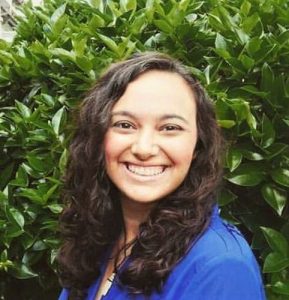
Bio: Annie Mejaes is currently pursuing a Master of Science degree in Resources, Environment and Sustainability at the University of British Columbia, with a focus on fisheries economics. Under the guidance of Dr. Rashid Sumaila, her thesis explores the nature and scope of different forms of aquaculture and their economic contributions. Prior to starting the program, Annie conducted marine conservation, environmental, and geospatial work across government agencies, non-governmental organizations, and academia in Hong Kong, Chile and the USA.
Examining the Impact of GM Adoption on Crop Yields
Abstract: Since their advent in 1996 genetically modified (GM) crops have been rapidly adopted by farmers, despite being a source of significant controversy. Opponents argue the environmental and social risks of GM crops while proponents maintain they reduce production losses, asserting that GM crops are key to food security as they produce higher yields. While understanding the implications of GM crops goes beyond just yield, it is nevertheless an important outcome. To date the analysis of GM crop yields have not been nuanced, relying largely on plot work or correlation studies without adequate controls. The recent availability of GM adoption rate data presents a new opportunity to investigate the historical impact of GM adoption on yields using national data. In this study, statistical and causal methods were employed to compare yields between GM-adopting and non-adopting countries while also considering dependent and cofounding variables.
Ginni Braich (PhD Candidate)
Supervisor Navin Ramankutty
 Bio: Ginni is a PhD candidate at the Institute for Resources, Environment and Sustainability under the supervision of Dr. Navin Ramankutty. Growing up in a farming family, her research interests are centered around agricultural production including trends in yields and the impacts of climate change as it relates to current and future food security.
Bio: Ginni is a PhD candidate at the Institute for Resources, Environment and Sustainability under the supervision of Dr. Navin Ramankutty. Growing up in a farming family, her research interests are centered around agricultural production including trends in yields and the impacts of climate change as it relates to current and future food security.
She holds a B.Sc. in Biology from the University of Calgary and a M.Sc. in Plant Molecular Biology from the International Max Planck Research School for Molecular Biology. Her professional background includes working for a government funding agency, supporting research in sustainable agriculture in collaboration with other governments, NGOs and farmer groups.
Beyond naturalness? Exploring social dimensions of novel gene-editing technologies in agriculture
Abstract: Proponents are heralding gene-editing and related technologies as crucial solutions for adapting agriculture to the dual challenges of climate change and food security. These technologies, however, also seem likely to pose important risks, ethical dilemmas, and governance challenges. In her doctoral thesis, Sara explores how these technological shifts are necessitating new thinking around the ‘naturalness’ of crops and livestock—raising heated justice-related debates around the global governance of agricultural genetic resources, and destabilizing national biosafety regulations for genetically engineered crops worldwide. She also suggests new dimensions for understanding public perception of gene editing that are based on system-level critiques of food systems, rather than technical specifics or individual attitudes.
Sara Nawaz (PhD Candidate)
Supervisor Terre Satterfield
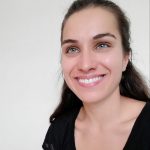
Bio: Sara is a PhD Candidate at IRES, supervised by Terre Satterfield. Prior to beginning the PhD, she worked as a research assistant at the World Resources Institute and as a consultant at Environmental Resources Management, both in Washington, D.C. She has a B.A. in economics from Swarthmore College and an M.Phil. in Development Studies from the University of Oxford. In her free time, she rock climbs as much as possible.
April 8, 2021: IRES Faculty Seminar with Erle Ellis
IRES Seminar Series
Time: 12:30pm to 1:30pm (every Thursday)
View video.
*********************************************************************************
Shaping a Better Nature in the Anthropocene
Global evidence confirms that human societies have gained the capacity to transform our entire planet. Could this unprecedented capacity be redirected to shape a better future for both people and the rest of nature? This presentation explores the possibility that some of the same social processes that have transformed this planet for the worse could also transform it for the better. Working together, people are a force of nature. The planet we make will reflect the people we are.
Erle Ellis
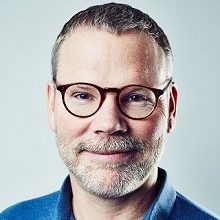
Professor, Geography and Environmental Systems, University of Maryland, Baltimore County
Bio:
Erle Ellis is a Professor of Geography and Environmental Systems at the University of Maryland, Baltimore County (UMBC). His research investigates the ecology of human landscapes towards sustainable stewardship of the biosphere in the Anthropocene. He teaches environmental science and landscape ecology at UMBC and has taught landscape ecology at Harvard’s Graduate School of Design. He is a member of the Anthropocene Working Group of the International Commission on Stratigraphy, a Fellow of the Global Land Programme and a Senior Fellow of the Breakthrough Institute. His first book, Anthropocene: A Very Short Introduction, was published in 2018.
April 1, 2021: IRES Faculty Seminar with Sonja Klinsky
IRES Seminar Series
Time: 12:30pm to 1:30pm (every Thursday)
Via Zoom
View video.
*********************************************************************************
Relationships of (In)Justice: Strategies for Engaged Scholarship with Climate Justice
Debates about (in)justice are central to efforts to imagine, design or implement climate policy, even when not immediately apparent. The intensity of these debates, along with the multi-dimensional and multi-scalar complexity of them, raises a number of challenges for those seeking to do engaged scholarship. In this talk, I will discuss how approaching climate (in)justice through the lens of relationships can be a productive way to orient engaged scholarship in the climate justice context. Using examples from a wide range of climate-justice projects, I will focus on the capacity for relational approaches to: better integrate historically rooted patterns of exploitation into analyses and engagement; reflect and integrate the diversity of issues bearing on and shaping the decision options of various communities; engage with the social-psychological challenges inherent to injustice; and highlight opportunities for solidarity as a guiding concept for engaged scholarship.
Sonja Klinsky
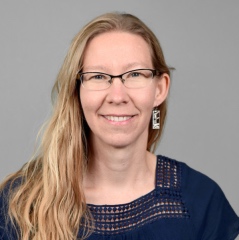
Associate Professor, School of Sustainability, Arizona State University
Bio:
Sonja Klinsky is an Associate Professor at the School of Sustainability at Arizona State University. Her work focuses on the challenges of climate justice at the domestic and international levels. As an interdisciplinary scholar, this work sits at the intersection of political theories of justice, legal and economic approaches to climate change policy, and public engagement. She has published on climate justice within the international and domestic arenas, including on transitional justice, the utility of feminist scholarship to climate justice, strategies for embedding justice into climate policy design and evaluation at multiple scales, and public engagement with climate justice. Sonja is also an IRES PhD alumna.
March 25, 2021: IRES Faculty Seminar with Gordon Christie
IRES Seminar Series
Time: 12:30pm to 1:30pm (every Thursday)
Via Zoom
View video.
*********************************************************************************
Canadian Law and Indigenous Self-Determination
While Indigenous peoples across Canada engage in struggles over lands and waters, other battles rage in less visible forms. Academics analyzing events argue about what led to this world of conflict and about how to resolve tensions. If it were simply a matter of competing descriptive models one might pass by these debates, but arguably more is at stake than just arriving at the right picture. Parties attempt to stamp accounts with layers of meaning that reinforce ways of thinking about how people can live in the world. This is particularly evident in the legal arena, as Canadian jurists frame approaches to Crown-Indigenous relations within a specific liberal worldview, while Indigenous peoples argue about the continued existence of their own legal and political authority. Focusing on the terrain of the law, I explore two ways of thinking of what it is to exist in the world, two ways that animate conflicting descriptive models, and try to get at what this signals for how Canada ‘reconciles’ with Indigenous peoples.
Gordon Christie
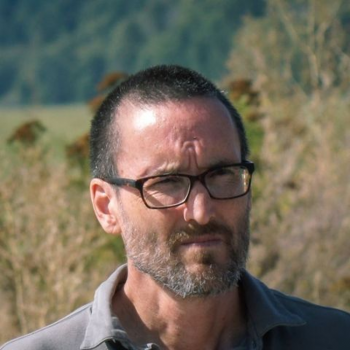
Professor, Peter A. Allard School of Law, UBC
Bio:
Professor Christie is Inupiat/Inuvialuit and specializes in Aboriginal law. He has a PhD (in philosophy) from the University of California, Santa Barbara and a LLB from the University of Victoria. His teaching is primarily in the fields of Aboriginal law, torts and legal theory, and his research work is entirely concerned with Aboriginal/Indigenous law and legal theory (and their intersection). His most recent work focuses on how colonial systems of cultural meaning frame Canadian jurisprudence around Aboriginal rights.
March 18, 2021: IRES Student Seminar with Madison Stevens and Rocío López de la Lama
IRES Seminar Series
Time: 12:30pm to 1:30pm (every Thursday)
Via Zoom
View video.
*********************************************************************************
Rights, Responsibilities, and Stewardship in a Mosaic “Lawscape”: Evidence From Community Forests in the Indian Himalaya
The role of community stewardship in biodiversity conservation has taken centre stage as conservation actors recognize the influence of the human-dominated matrix on biodiversity outcomes, and the social injustices of exclusionary protected areas. Among the oldest examples of formalized forest co-management in the world, the van panchayats of Uttarakhand, India are owned by the State and managed by local rightsholders. Though codified as discrete management units, van panchayats are not islands: the benefits they deliver are interdependent among a mosaic of management and tenure models. Drawing on qualitative research in Johar Valley, in the Greater Himalaya, this study explores how forest councils navigate their stewardship roles vis-à-vis neighboring communities and governing authorities. The distribution of forest rights and responsibilities among and between forest actors illustrates the complex topography of this “lawscape.” This study aims to shed light on the opportunities and barriers this mosaic presents for stewarding communities as they care for ecologically and culturally significant places.
Madison Stevens
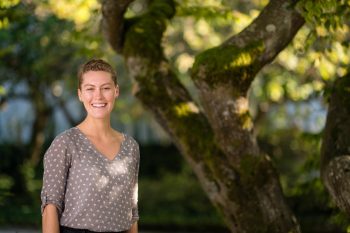
IRES PhD Program
Bio:
Madison is a PhD Candidate at the Institute for Resources, Environment, and Sustainability at the University of British Columbia, under the supervision of Dr. David Boyd and Dr. Janette Bulkan. Her research interests center on the intersection of human rights and conservation, examining the implementation of rights-based approaches to protected areas. Her dissertation work employs qualitative ethnographic methods and a political ecology lens to understand the governance dimensions of community forests in Uttarakhand, India. She is also involved in collaborative projects focused on the equity dimensions of climate adaptation and the use of evidence in conservation planning. Madison holds a BA in Comparative Literary and Cultural Studies from Franklin University, Switzerland, in 2015, where her thesis highlighted Indigenous land rights and conflict in Uganda. Her professional background includes a decade of experience working for conservation nonprofit organizations, notably as an Education Media Specialist and Logistics Coordinator with Polar Bears International since 2011. Volunteer and work opportunities with a range environmental initiatives have taken her all over the world, including an international conference on climate change in Antarctica with 2041, and research on sustainable development in sub-Saharan Africa.
Who Are These Crazy People? Sharing the Stories Behind Privately Protected Areas in Peru
Private protected areas (PPA) in Peru represent an innovative way of conserving and defending nature, accounting for almost 400,000 protected hectares nationwide. Unlike PPAs in the Global North, PPAs in Peru are managed by local communities and families without any type of incentive or government support. Thus, representing a fascinating case-study for studying people’s relationships with nature and their motivations for voluntarily protecting the land. In this presentation, I will focus on PPAs run by individuals and families throughout the country. By having conducted online interviews and a legal document analysis, I hope to convey PPAs owners’ stories about their relationships with the land, wildlife and people.
Rocío López de la Lama
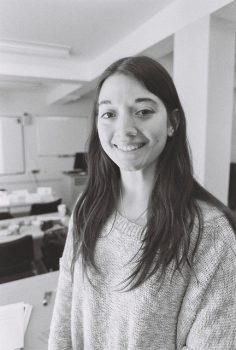
IRES PhD Program
Bio:
Rocío López de la Lama is a PhD Candidate under the supervision of Dr. Kai Chan. She has been working in nature conservation since 2012, mainly in Peru, focusing on people’s relationships with nature from different perspectives (e.g., small-scale fisheries, protected areas). Her current work explores voluntary land conservation in Peru, shedding light into people’s values, motivations and concerns regarding nature’s protection. Rocio is a biologist and holds a Master of Philosophy in Conservation Leadership from the University of Cambridge.
March 9-21: Parks and Protected Areas Research Network Virtual Research Summit
Hosted by Canadian Parks Collective for Innovation and Leadership (CPCIL), the Virtual Research Summit will bring together “Knowers” (scholars/knowledge keepers), “Doers” (practitioners), and “Learners” (students, new hires) from across the country to make personal connections and build a network of passionate individuals in the parks and protected areas field.